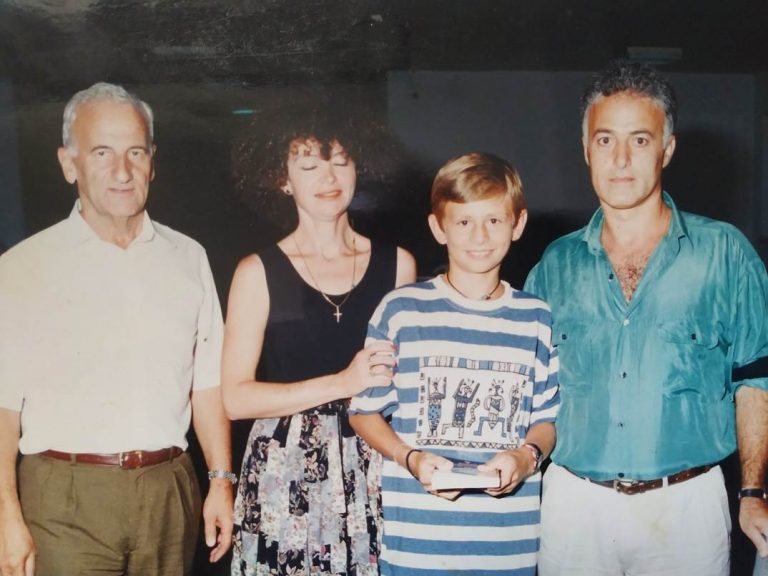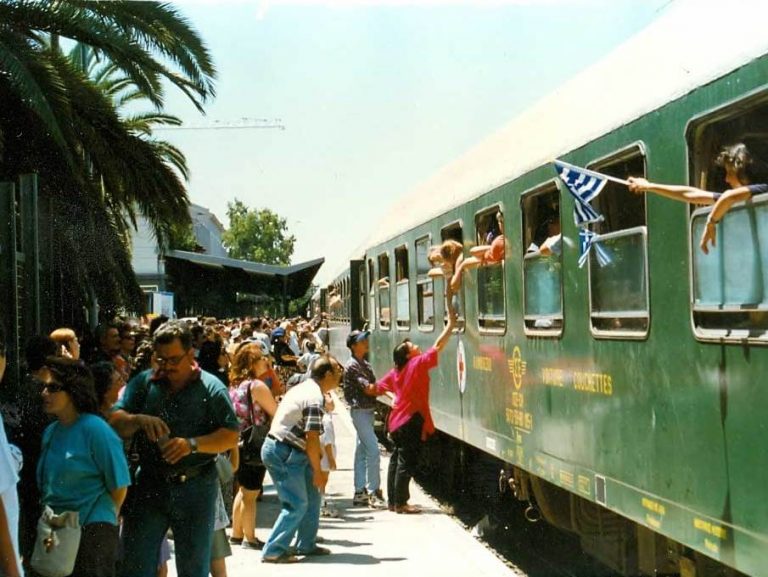During the war, thousands of children from Republic of Srpska, Serbia and other parts of our country lived in Greece, where they were placed with families that provided them with shelter and warmth. The connections that were then established still last. This is a fragment of the story about them.
In the winter of 1995, among the children who arrived in Agrinio, the largest city in the Greek region of Aetolia-Acarnania in the western part of the country, was Milko Zivak, from Konjic (Bosnia and Herzegovina) with a temporary refugee address at Boracko Lake (Serbian city in Bosnia), where many Serb families fled Konjic to save their lives.
In their home in February of that year, Milko, then a 4th grade elementary school student, was received by the Milonas family and immediately informed that in the next six months, as he says, he will be their “third child.”
“That January, I arrived in a country hitherto unknown to me and stayed with the Milonas family for six months. It took me about a month to adjust and master the language to some extent, but their care helped me cope quickly. Everything that their children had, I also had, from food and clothes to money. They made sure that I didn’t feel isolated in any way, “Zivak recalls of his first of several stays in Greece.
He will soon be shown and convinced that the whole of Greece is just like that family. With the help of various organizations, children from the Republic of Srpska – 25 of them – traveled to the Mediterranean country for the first time in 1995 and witnessed its wonders, and attended school along the way.
“The Greeks looked after us like “a little drop of water in the palm of their hand” (Serbian way of saying-“took great care of us”) and we went somewhere every weekend. They took us, not only to Athens, but we visited practically everything that should be visited in Greece at all. I remember, I had a feeling that the whole city of Agrinio, which has 100,000 inhabitants, was ‘subordinate to us.’ Nothing could pass without us. We went to all the concerts, all the festivals, parades and holidays and they always made sure we were in the front row. “
One detail is especially symbolic. During their stay in Greece, children from Republic of Srpska attended primary school in Agrinia. Every day before the beginning of classes and the students entered the classrooms, the Greek anthem was sung, and immediately afterwards the anthem of the Republic of Srpska, and today the anthem of Serbia, “God of Justice” was played. Only then did it “ring” for the first hour.
Milko Zivak, who lives in Visegrad today, traveled to Greece several more times after 1995, at the invitation of his second family and on his own initiative. He talks to Milonas regularly.
“We are still in contact and talk to each other often, not just on holidays. Greece helped us after the war in various ways. “

“I went to Greece for the first time in 1995, and I was received there by the Katsakulis family in Patras. It is said that there is something good in every misfortune, and so it was in my case. I lost my father in the war, but I also had a second family in Greece. “
Like Milko, Zoran was immediately accepted as a family member without reservations. He was also baptized in Orthodox Greece.
“They accepted me as their child and for Christmas I sat at the front of the table next to Vagelis, the man whose Greek name I took when I was baptized in the church of Hagia Sophia in Patras. Not only I got help, but also my sisters who also went to the same family, and they also sent money to my mother so that she could prepare us for school, or for some other needs, “says Zoran.
He has ties with his family from Greece as if they are blood relatives, and if it weren’t for this situation with the corona virus, he says, “he would have already made a plan for how he will spend his vacation in Patras.”
Republic of Srpska Representation in Greece in action: Let's not forget invisible heroes
The Republic of Srpska Representation in Greece has decided to do something so that these stories do not fall into oblivion. With the cordial help of one of the most famous Greek actors, Janis Servetas, the mission called on all, as they say, “invisible heroes of Greece” who hosted Serbian children during the war, to contact them so that all the generosity and selfless help of Greece to the Serbian people would be permanently remembered.
Jelena Jovanovich, the head of the Republic of Srpska Representation in Greece, told Mondo that the help that the Greeks provided to the Republic of Srpska during the war has not been properly recorded so far, and there is a danger that it will be forgotten.
“We want to make a story that will help remember Greek help. The project is called “Invisible Heroes of Greece”. The goal is for people to contact us, to see which of them wants to tell a story, share stories, photos or documents. In the second phase, we would immortalize it with a book or a documentary. The first phase is to find as many of these families as possible. In that way, we want to awaken ties and say a big thank you to the Greek people for helping us. “
Jovanovich says that there is no exact data on how many children from Republic of Srpska and Serbia went to Greece during the war. The Red Cross participated in the organization, and the Greek Church and our clergy and bishops helped a lot.
“They have some data, and the Red Cross has some data. The exact number does not exist. According to our information from the Republic of Srpska, at least 2,500 children stayed with Greek families, and that number is probably much higher. “Based on the reactions of Greeks and Serbs during the first day when we announced this action, we can already see that there are more families than we thought.”
According to the data on the website of the Serbian Red Cross, which from 1993 to 2011 in cooperation with the Greek Red Cross organized the stay of Serbian children with Greek families, this program covered over 18,000 children from Serbia, Republic of Srpska, Montenegro, and the Republic of Serbian Krajina over 18 years. “The recovery program included children who lost their parents in the war, refugee children, children placed in foster families, children missing and abducted in Kosovo and Metohija, and children from socially endangered families growing up from 8 to 16 years of age,” the Red Cross website reads.
From the beginning of the story, two of our interlocutors support the action of the Representation of Republic of Srpska based in Thessaloniki and agree that this is the least that can be done by the Republic of Srpska which is deeply indebted to friendly Greece.
Milko Zivak agrees that it is time to express gratitude to Greece, not only by the people who stayed there: “Now it is time for our state to do it officially.”
An invitation is opened at the Republic of Srpska Representation in Thessaloniki: “Share your story with us, help us keep these stories written, so that no one ever forgets them!”

Ευχαριστω παρα πολυ!!!
To be continued….


Hvala narodu Grčke na zbrinjavanju i ljudskoj pomći naše dece Republike Srbske, porodicama koje su prihvatile našu decu kao svoju,ni sam neznam na koji način se zahvaliti divnim ljudima, porodicama Grčke, to je veliko delo koje će se pamtiti vekovima, slobodno mogu napisati to su naša braća i sestre, veliko H V A L A Grčka-Republika Srbska i Srbija !
Jedan od nacina da im se za sad zahvalimo jeste da sacuvamo ovaj dogadjaj od zaborava. Dijeli dalje link da bi ovi nevidljivi heroji postali vidljivi svijetu i usli u knjige istorije. Gospod nek im svakim dobrom uzvrati .